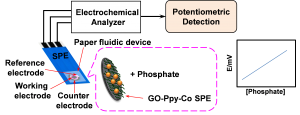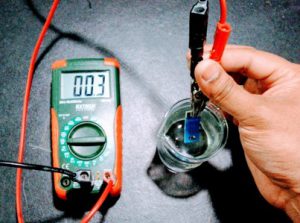
OTT1513
Applications
Drinking water treatments, wastewater treatments, aquaculture operations, aquariums, analytical and
pharmaceutical laboratories, fertilizers industry
Target Problems
• Increased levels of phosphate can lead to eutrophication, low oxygen in waterways that can severely
affect aquatic life, and toxic algal blooms.
• The EPA approved method for measuring phosphates involves the use of chemical reagents.
• In some cases, samples must be brought back to the lab for analysis.
Key Features
• Highly Sensitive – Detects phosphate levels as low as 10^-10 M (mol/L)
• Low Cost – Off-the shelf materials with only a voltmeter needed for detection
• Disposable and Easy-to-Use – One time use sensors that can be mounted or handheld
• Pre-Calibrated and Quick – Sensors can be supplied pre-calibrated, saving time
• Multiple Applications – Residential, industrial, environmental, governmental and research uses
Technology
Inventors at UW-Milwaukee (UWM) have developed a highly sensitive, digital, graphene based electrochemical sensor for the detection of phosphate in water. The sensor is designed to detect phosphate levels as low as 10^-10 M (mol/L) using layers of graphene oxide, polypyrrole and metal. The sensor is specific and can avoid interference from potassium chloride present in the solution. The sensor is easier to use and more sensitive compared to other reported devices, many of which focus on a colorimetric assay. It uses a simple digital potential readout through a voltmeter rather than voltaic stripping. The system can be handheld for mobility or mounted as a semi-permanent device. Positive test results have shown that, this device can provide an accurate and inexpensive alternative to the current products on the market.


